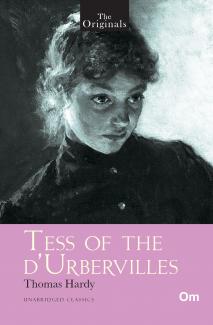THE ORIGINALS TESS OF THE DURBERVILLES (UNABRIDGED CLASSICS)
Thomas Hardy was an English poet and novelist. He was bon in the village of Upper Bockhampton in Dorset, England in 1840, His father was a stone mason as well as a violinist. His mother was an avid reader and thanks to his parents, Hardy was introduced to architecture and music and grew to love them. These interests were evident in his novels as well as the lifestyles of the country folk. So was his passion for all types of literature. Hardy taught himself Latin, German and French by reading the books he found in Dorchester, the nearby town. At sixteen, Hardy was apprenticed to a local architect but would study in the evenings with Greek scholar Horace Moule. In 1862, Hardy was sent to London to work with the architect Arthur Blomfield. For five years, Hardy studied the cultural scene in London as well as classic literature. He chose to return to Dorchester and took with him the burning desire to write Hardy's most accomplished literary works include The Mayor of Casterbridge, The Return of the Native, and Far from the Madding Crowd. Thomas Hardy died in 1928 aged 87 after a long and highly successful life. But his legacy shall live on forever. ... Read more Read less
This hobble of being alive is rather serious, don’t you think so? Thomas Hardy’s magnum opus, Tess of the d’urbervilles first appeared in book form in 1891. It initially received mixed reviews and was censored due to the challenges that it presented to the sexual morals of Victorian society. However, through the subtitle of the novel, a purewoman faithfully presented, Hardy sympathises with the working class woman who becomes a hapless victim of the rigid Victorian society. Tess of the d’urbervilles was later considered one of the greatest novels of the nineteenth century. Through Tess Durbeyfield, Hardy skilfully shows the social injustices that are deeply rooted in gender. A moving tale of loss, unrequited love and condemnation, the novel has one of the most tragic endings of all time. Adapted to film, theatre and television several times over, the novel is a timeless classic. ... Read more Read less











